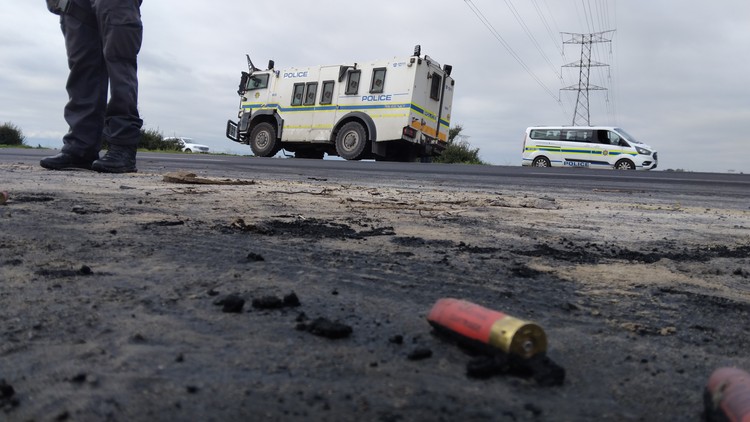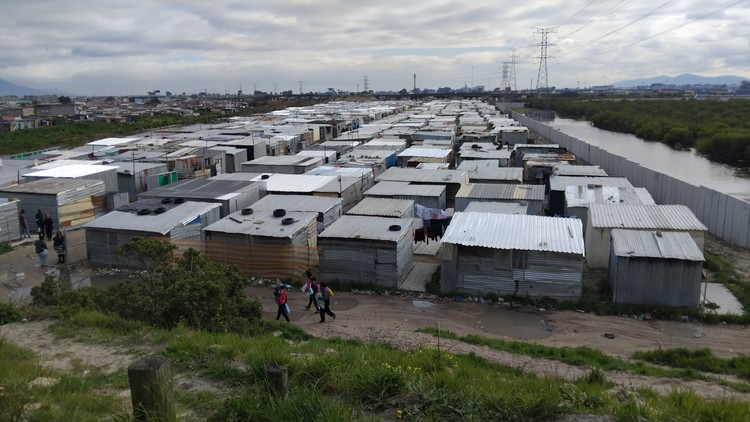Former rail line occupiers demand electricity
Protesters blocked the R300 in Cape Town on Thursday
Police used rubber bullets to disperse protesters blocking the R300 on Thursday morning. Photos: Sandiso Phaliso
Dozens of people who were relocated from houses they had built on Cape Town’s central rail line staged a protest on Thursday morning, blocking a section of the R300 between Mitchell’s Plain and Philippi with burning tyres.
They are demanding electricity and better service delivery from the Passenger Rail Agency of South Africa (PRASA) and the City of Cape Town. By 10am, the crowd was dispersed by police using rubber bullets.
The protesters belong to the 900 households that in 2019 built shacks on unused railway lines in Nyanga and Phillipi. They were moved to a new settlement in Phillipi East, named Loyiso Nkohla Mabandla Village, in December 2023 by so that the rail lines could be restored
This was a temporary solution, and PRASA is yet to confirm plans for a permanent resettlement.
Residents previously protested for water supply. Standpipes and portable toilets have since been installed by the City of Cape Town. But they now complain that toilets are not cleaned as often as they should be, and there is no formal electricity.
There is also no company contracted to clean the area, so rubbish is being dumped in between houses, residents say.
Residents have been protesting for months, preventing PRASA contractors from rehabilitating the central line in Mitchell’s Plain.
Community leader Lizo Magebe told GroundUp on Thursday that households have informally connected to the electricity supply of houses from the neighbouring settlement, “renting” their connection for R350 a month.
This often overloads the system, and the electricity supply is not stable.
“Sometimes we go for weeks without electricity. This is not the kind of life that PRASA had promised when they relocated us here,” Magebe said.
Resident Phumlani Sibewu said Thursday’s protest was a last resort because they have engaged PRASA numerous times with no success.
“It is clear protesting is the only language they hear because when we did not have water and toilets we did the same and those were provided,” he said.
PRASA spokesperson Andiswa Makanda told GroundUp that the provision of water and ablution facilities was “to ensure comfort and livability”. The “permanent relocation is being coordinated through an intergovernmental structure,” said Makanda. She referred questions about electricity supply to the City of Cape Town.
The City of Cape Town did not respond to questions by the time of publication.
About 900 households that had previously occupied rail lines in Nyanga and Phillipi were relocated to this piece of land in Phillipi East in 2023.
Support independent journalism
Donate using Payfast

Don't miss out on the latest news
We respect your privacy, and promise we won't spam you.
Next: Protest outside US Consulate in Cape Town as Israel moves to take over Gaza City
Previous: Cape Union Mart and pro-Palestine activists gear up for court battle
© 2025 GroundUp. This article is licensed under a Creative Commons Attribution-NoDerivatives 4.0 International License.
You may republish this article, so long as you credit the authors and GroundUp, and do not change the text. Please include a link back to the original article.
We put an invisible pixel in the article so that we can count traffic to republishers. All analytics tools are solely on our servers. We do not give our logs to any third party. Logs are deleted after two weeks. We do not use any IP address identifying information except to count regional traffic. We are solely interested in counting hits, not tracking users. If you republish, please do not delete the invisible pixel.


